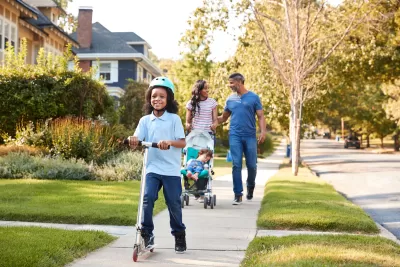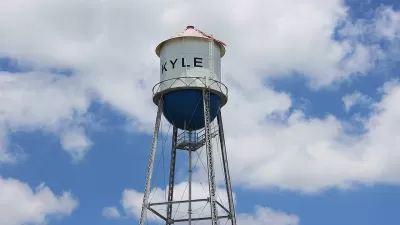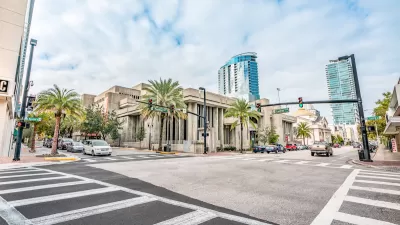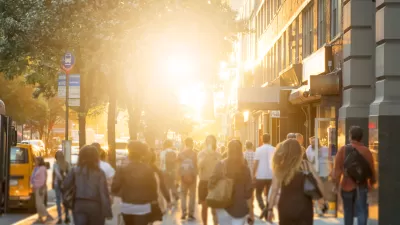Often overlooked, liminal spaces like front porches and sidewalks can boost social connections.

Writing in the Congress for the New Urbanism’s Public Square, Robert Steuteville outlines the growing evidence that front porches and sidewalks play a much more important role in civic life than they’re often given credit for, acting as critical components of social infrastructure.
“Porches are a transition zone between the public realm and private realm and they help to ease engagement with neighbors,” while sidewalks provide both critical safety infrastructure and a way for residents to meet and interact with one another. Steuteville cites several recent articles showing that more writers and urbanists are appreciating the benefits of porches and sidewalks.
Meanwhile, around the country, cities are committing to efforts to improve and expand their sidewalk networks. “Denver, which found that some 40 percent of its streets have no sidewalks or substandard ones, has passed an ordinance mandating special property taxes to finish its network. Sacramento is planning to use 20 percent of its transportation budget to make public sidewalks more accessible. Ithaca, N.Y., charges $70 annually per household and $185 per business to build and maintain city sidewalks.”
Steuteville cautions that porches or sidewalks alone aren’t enough to create social cohesion out of thin air. “But combine porches and sidewalks together as part of an urban ensemble, and you have the building blocks of community.”
FULL STORY: The infrastructure of community

Study: Maui’s Plan to Convert Vacation Rentals to Long-Term Housing Could Cause Nearly $1 Billion Economic Loss
The plan would reduce visitor accommodation by 25,% resulting in 1,900 jobs lost.

North Texas Transit Leaders Tout Benefits of TOD for Growing Region
At a summit focused on transit-oriented development, policymakers discussed how North Texas’ expanded light rail system can serve as a tool for economic growth.

Why Should We Subsidize Public Transportation?
Many public transit agencies face financial stress due to rising costs, declining fare revenue, and declining subsidies. Transit advocates must provide a strong business case for increasing public transit funding.

Alabama: Trump Terminates Settlements for Black Communities Harmed By Raw Sewage
Trump deemed the landmark civil rights agreement “illegal DEI and environmental justice policy.”

Dear Tesla Driver: “It’s not You, It’s Him.”
Amidst a booming bumper sticker industry, one writer offers solace to those asking, “Does this car make me look fascist?”

A Visual Celebration of Manhattan’s Chinatown Elder Community, Through Food
Lanterns, cafeteria trays, and community connection take center stage in this stunning photo essay.
Urban Design for Planners 1: Software Tools
This six-course series explores essential urban design concepts using open source software and equips planners with the tools they need to participate fully in the urban design process.
Planning for Universal Design
Learn the tools for implementing Universal Design in planning regulations.
City of Santa Clarita
Ascent Environmental
Institute for Housing and Urban Development Studies (IHS)
City of Grandview
Harvard GSD Executive Education
Toledo-Lucas County Plan Commissions
Salt Lake City
NYU Wagner Graduate School of Public Service





























